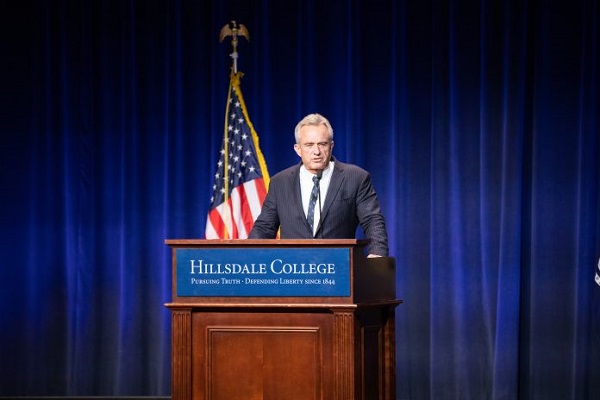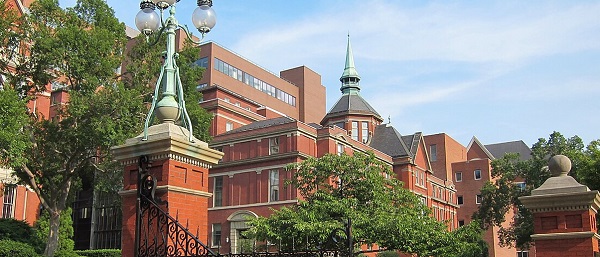Health
Robert F. Kennedy, Jr. Urges ‘Make America Healthy Again’

From Heartland Daily News
Despite dropping out of the race for president in August, Robert F. Kennedy, Jr. is turning up the volume on reforming national health care and drug policy and attracting attention to what role he might play in an administration depending on the outcome of the November election.
Kennedy has endorsed former president Donald Trump, and Trump has hinted that there could be a role in his second Trump administration.
Kennedy, who founded the safety advocacy group Children’s Health Defense, recently revealed the scope of his health care recommendations through his “Make America Healthy Again” agenda. Trump named Kennedy to his transition team and pledged to establish a panel of experts to work with Kennedy to investigate the increase of chronic health problems and childhood diseases in the United States (see related articles, pages 8,9).
In a September 5 op-ed in The Wall Street Journal, Kennedy laid out his 12-point Make America Healthy Again plan. Some of the ideas include reducing conflicts of interest at federal health agencies, implementing drug price caps, setting chemical and pesticide standards, requiring nutrition classes in medical school, redirecting money toward preventative care, rereleasing a presidential fitness standard, and expanding health savings accounts.
Boundary Crossing
Over the years, Kennedy has not hesitated to express his opinions, many of which have challenged long-held positions of the public health establishment on issues from vaccines and childhood obesity to the role of big pharmaceutical companies.
Kennedy’s stances cross ideological boundaries. His support of a single-payer national health care system conflicts with free-market opinions on the right, and his criticism of big-government bullying alienates the left. The nation’s painful experience with the measures taken to stem the spread of COVID-19 has attracted attention to Kennedy’s health care opinions in the wake of his forceful criticisms of those policies.
In a wide-ranging interview with Preferred Health magazine in June, Kennedy lambasted the lockdowns and the people he says profited from them.
“The people who came into the pandemic with a billion dollars, the Bill Gates, the Mark Zuckerbergs, the Bloombergs, the Jeffery Bezos, increased their wealth on average by 30 percent,” Kennedy told the publication.
“The lockdowns were a gift to them, the super-rich,” said Kennedy. “Jeffery Bezos, the richest or second-richest man in the world, was able to close down all of his competitors, 3.3 million businesses, and then give us a two-year training course about how to never use a retail outlet again in our lives. Forty-one percent of the black-owned businesses will never reopen. And he was instrumental because he was censoring the books that were critical of the lockdowns, including one that I wrote.”
Insider Advantage
Kennedy’s criticisms appeal to Craig Rucker, president of the Committee for a Constructive Tomorrow (CFACT).
“Kennedy, by virtue of his family name, is an insider, but his unorthodox views make him a provocative outsider,” said Rucker. “The public-health establishment, against which he has railed for years, failed miserably during the coronavirus pandemic. The ties between HHS and Big Pharma are far too cozy, and we have good reason to believe public health suffers as a consequence. A free spirit like his could be just what the doctor ordered.”
NIH Reform Call
Echoing his criticisms of the pandemic response, Kennedy says he wants to overhaul federal health care agencies, beginning with the National Institutes of Health (NIH).
The NIH suppressed the use of ivermectin and hydroxychloroquine during the early stages of the pandemic, in favor of, first, remdesivir and later the COVID vaccines through emergency use authorization, Kennedy argues. Saying the NIH “has been transformed into an incubator for the pharmaceutical industry,” Kennedy recommends removing much of the NIH’s funding for virology.
“It has stepped away from rigorous, evidence-based science, evidence-based medicine, into kind of a magical world,” Kennedy told Preferred Health. “It needs to have scientific discipline reimposed on the entire field of virology. We ought to be funding the study of the etiology of chronic diseases in our universities.”
Focus Shift
Kennedy has also spoken widely on chronic childhood diseases, some of which he has attributed to vaccines. Kennedy has called for public health authorities to shift their focus from infectious diseases such as COVID and influenza to devote more attention to diabetes, obesity, environmental toxins, and other longer-term concerns.
Kennedy has also cited large-scale factory farming and processed food as contributing to the nation’s health problems.
Peter Pitts, president and co-founder of the Center for Medicine in the Public Interest, says Kennedy brings a fresh perspective to public health debates.
“RFK Jr.’s penchant for not taking things at face value could go a long way toward forcing government public-health agencies to argue on behalf of their beliefs rather than simply relying on a ‘because I said so’ defense,” said Pitts.
Surprising Endorsements
Texas Agriculture Commissioner Sid Miller, a Republican, praised Kennedy’s efforts in a September 26 op-ed for Fox News.
“The role of Big Food, much like Big Pharma, is to prioritize their profits over our health,” wrote Miller. “I enthusiastically support RFK Jr.’s campaign to hold these industries accountable by reforming our food and medicine approval and patenting systems. In this he is uniquely qualified: the $1.7 trillion pharmaceutical industry has unfairly maligned him for decades, and he’s still standing strong.”
In a move that raised eyebrows, Robert Redfield, who headed the Centers for Disease Control and Prevention (CDC) under Trump from 2018 to 2021, endorsed Kennedy’s reform efforts in a Newsweek op-ed in September.
“If the next president prioritizes the National Institutes of Health (NIH) to identify which exposures are contributing to the spike in chronic disease in children, we will finally find out and end what is slowly destroying our children,” wrote Redfield.
Bonner Russell Cohen, Ph.D., ([email protected]) is a senior fellow at the National Center for Public Policy Research.
Dr John Campbell
Cures for Cancer? A new study shows incredible results from cheap generic drug Fenbendazole

From Dr. John Campbell
You won’t hear much about Fenbendazole from the regular pipeline of medical information. There could be many reasons for that. For one, it’s primarily known for it’s use in veterinary medicine. Somehow during COVID the medical information pipeline convinced millions that if a drug is used on horses or other animals it couldn’t work for humans. Not sure how they got away with that one considering the use of animal trials for much of modern medical history.
Another possible reason, one that makes at least as much sense, is that there’s no business case for Fenbendazole. It’s been around for decades and its patent expired in the early 1990’s. That means it’s considered a generic drug that a pharmaceutical company from India could (and does) produce in mass quantities for very little profit (compared to non-generics).
So Fenbendazole is an inexpensive, widely accessible antiparasitic drug used in veterinary medicine. During the COVID pandemic a number of doctors, desperate for a suitable treatment, tried it with reportedly great levels of success. Over some time they discovered it might be useful elsewhere. Some doctors are using Fenbendazole to help treat late stage cancer. Often this is prescribed when the regular treatments clearly aren’t working and cancer is approaching or has already been declared stage 4.
What they’ve found at least in some cases is astounding results. This has resulted in a new study which medical researcher Dr. John Campbell shares in this video.
Addictions
Canadian gov’t not stopping drug injection sites from being set up near schools, daycares

From LifeSiteNews
Canada’s health department told MPs there is not a minimum distance requirement between safe consumption sites and schools, daycares or playgrounds.
So-called “safe” drug injection sites do not require a minimum distance from schools, daycares, or even playgrounds, Health Canada has stated, and that has puzzled some MPs.
Canadian Health Minister Marjorie Michel recently told MPs that it was not up to the federal government to make rules around where drug use sites could be located.
“Health Canada does not set a minimum distance requirement between safe consumption sites and nearby locations such as schools, daycares or playgrounds,” the health department wrote in a submission to the House of Commons health committee.
“Nor does the department collect or maintain a comprehensive list of addresses for these facilities in Canada.”
Records show that there are 31 such “safe” injection sites allowed under the Controlled Drugs And Substances Act in six Canadian provinces. There are 13 are in Ontario, five each in Alberta, Quebec, and British Columbia, and two in Saskatchewan and one in Nova Scotia.
The department noted, as per Blacklock’s Reporter, that it considers the location of each site before approving it, including “expressions of community support or opposition.”
Michel had earlier told the committee that it was not her job to decide where such sites are located, saying, “This does not fall directly under my responsibility.”
Conservative MP Dan Mazier had asked for limits on where such “safe” injection drug sites would be placed, asking Michel in a recent committee meeting, “Do you personally review the applications before they’re approved?”
Michel said that “(a)pplications are reviewed by the department.”
Mazier stated, “Are you aware your department is approving supervised consumption sites next to daycares, schools and playgrounds?”
Michel said, “Supervised consumption sites were created to prevent overdose deaths.”
Mazier continued to press Michel, asking her how many “supervised consumption sites approved by your department are next to daycares.”
“I couldn’t tell you exactly how many,” Michel replied.
Mazier was mum on whether or not her department would commit to not approving such sites near schools, playgrounds, or daycares.
An injection site in Montreal, which opened in 2024, is located close to a kindergarten playground.
Conservative Party leader Pierre Poilievre has called such sites “drug dens” and has blasted them as not being “safe” and “disasters.”
Records show that the Liberal government has spent approximately $820 million from 2017 to 2022 on its Canadian Drugs and Substances Strategy. However, even Canada’s own Department of Health admitted in a 2023 report that the Liberals’ drug program only had “minimal” results.
Recently, LifeSiteNews reported that the British Columbia government decided to stop a so-called “safe supply” free drug program in light of a report revealing many of the hard drugs distributed via pharmacies were resold on the black market.
British Columbia Premier David Eby recently admitted that allowing the decriminalization of hard drugs in British Columbia via a federal pilot program was a mistake.
Former Prime Minister Justin Trudeau’s loose drug initiatives were deemed such a disaster in British Columbia that Eby’s government asked Trudeau to re-criminalize narcotic use in public spaces, a request that was granted.
Official figures show that overdoses went up during the decriminalization trial, with 3,313 deaths over 15 months, compared with 2,843 in the same time frame before drugs were temporarily legalized.
-

 International2 days ago
International2 days agoIs America drifting toward civil war? Joe Rogan thinks so
-

 COVID-192 days ago
COVID-192 days agoMajor new studies link COVID shots to kidney disease, respiratory problems
-

 Censorship Industrial Complex2 days ago
Censorship Industrial Complex2 days agoEU’s “Democracy Shield” Centralizes Control Over Online Speech
-

 Alberta22 hours ago
Alberta22 hours agoChatGPT may explain why gap between report card grades and standardized test scores is getting bigger
-

 Fraser Institute1 day ago
Fraser Institute1 day agoCourts and governments caused B.C.’s property crisis—they’re not about to fix it
-

 Alberta12 hours ago
Alberta12 hours agoFederal budget: It’s not easy being green
-

 International2 days ago
International2 days agoUS announces Operation Southern Spear, targeting narco-terrorists
-

 Education20 hours ago
Education20 hours agoJohns Hopkins University Announces Free Tuition For Most Students




